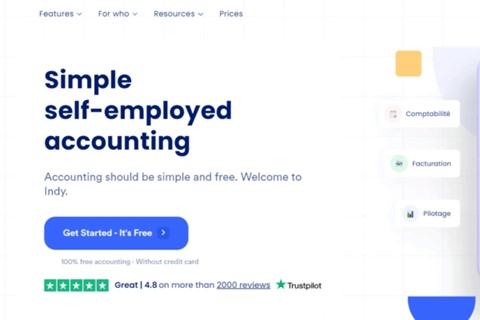Accounting AI tools are revolutionary software solutions that leverage artificial intelligence to streamline financial management processes. By harnessing the power of machine learning and natural language processing, these tools automate various accounting tasks, empowering businesses to save time, reduce administrative costs, and improve accuracy. This article will explore the market’s essential features, target users, and top accounting AI tools. We’ll also delve into real-world case studies, future trends, and the challenges and limitations of adopting AI in accounting.
Benefits of Accounting AI Tools
Reduce Administrative Costs
Accounting AI tools automate repetitive and time-consuming tasks, freeing accounting professionals to focus on strategic decision-making. It leads to cost savings by minimizing the need for manual labor and data entry.
Increase Accuracy
AI-powered algorithms are designed to analyze data precisely, significantly reducing human error likelihood. Improved accuracy ensures reliable financial reporting and compliance.
Save Time
With automated processes, accounting tasks that once required hours or days can now be completed in minutes. Time savings enable businesses to allocate resources more efficiently.
Key Features of Accounting AI Tools

The key features of accounting AI tools are:
Automated Bookkeeping:
AI tools automate data entry, categorization, and reconciliation of financial transactions, simplifying the bookkeeping process.
Tax Compliance:
These tools stay updated with ever-changing tax regulations, ensuring businesses remain compliant and reducing the risk of penalties.
Smart Data Analysis:
AI-driven analytics provide actionable insights from financial data, enabling businesses to make informed decisions and identify trends.
Fraud Detection:
Accounting AI tools employ sophisticated algorithms to detect anomalies and potential fraud, safeguarding businesses against financial losses.
Automated Invoicing:
By automating invoice generation and payment reminders, businesses can maintain a smooth cash flow and improve client relationships.
Factors to Consider When Choosing Accounting AI Tools
Define Your Needs

Identify your accounting requirements and pain points. Determine the tasks or processes you want the AI accounting software to address, such as automated bookkeeping, tax compliance, or intelligent data analysis.
Research and Compare
Conduct thorough research on different AI accounting software providers. Compare their features, functionalities, and customer reviews. Look for reputable providers with a proven track record and positive user feedback.
Compatibility and Integration
Ensure the AI accounting software integrates smoothly with your existing systems, such as your financial management software or CRM. Compatibility is crucial to avoid data inconsistencies and workflow disruptions.
Scalability and Flexibility
Consider your business’s growth potential and choose software to scale alongside your needs. The software should accommodate increased data volume, user capacity, and additional functionalities as your business expands.
Security and Support
Give data privacy and security a top priority. Ensure the software provider has adequate security controls to safeguard your financial information. To ensure a seamless implementation and ongoing support, evaluate the provider’s level of training and support as well.
Target Users of Accounting AI Tools
Small Business Owners: Accounting
AI tools cater to small businesses with limited resources, allowing them to manage finances efficiently without hiring a dedicated accounting team.
Accountants:
Accounting professionals can utilize AI tools to enhance their productivity and provide higher-value advisory services to clients.
Bookkeepers:
AI tools assist bookkeepers in streamlining their workflows and maintaining accurate financial records.
Auditors:
Auditors can leverage AI to perform in-depth financial analysis and identify potential discrepancies during audits.
Data Analysts:
AI tools provide data analysts with powerful insights that facilitate data-driven decision-making.
Top Accounting AI Tools in the Market
The best 5 tools of accounting AI in the market are:
Trello – Unlock Your Productivity and Efficiency
Docyt
Docyt offers a comprehensive AI-powered business platform, including automated bookkeeping, invoice management, and intelligent data analysis.
Pricing Options:
Subscription-based plans tailored to business size and needs.
User Reviews:
Positive feedback on ease of use and accuracy.
Zeni

Zeni specializes in AI-driven bookkeeping and financial analytics, emphasizing data security and real-time insights.
Pricing Options:
Transparent pricing structure based on transaction volume and complexity.
User Reviews:
Praised for its efficiency and proactive financial guidance.
Blue dot

Blue dot integrates AI-driven accounting with inventory management and sales analytics for a comprehensive financial solution.
Pricing Options:
Flexible plans suited to businesses of all sizes, with additional modules available.
User Reviews:
Noted for its robust features and customization options.
Truewind.ai

Truewind.ai focuses on advanced data analysis and forecasting capabilities, assisting businesses in making data-driven financial decisions.
Pricing Options:
Tiered pricing based on the complexity and scale of financial operations.
User Reviews:
Highly rated for its predictive analytics and user-friendly interface.
Indy
Indy offers a user-friendly interface for automating bookkeeping tasks, managing invoices, and generating financial reports.
Pricing Options:
Simple pricing plans with scalable options to accommodate business growth.
User Reviews:
Commended for its intuitive design and accurate data processing.
Case Studies: Success Stories of Using Accounting AI Tools
Company A: Streamlining Bookkeeping Processes Challenges: Manual data entry, reconciliation errors, and time-consuming tasks.
Company A, a medium-sized manufacturing company, faced challenges in its bookkeeping processes. The manual data entry and reconciliation tasks consumed significant time and were prone to errors, leading to inefficiencies and potential financial discrepancies. The company recognized the need for a solution to automate these processes and improve accuracy.
Implementation: Company A decided to implement an AI accounting tool designed explicitly for automated bookkeeping to address their challenges. The device utilized advanced machine learning algorithms to automate data entry, categorization, and reconciliation of financial transactions. The software seamlessly integrated with their existing financial management system, ensuring smooth data flow and consistency.
Results: Reduced bookkeeping time by 70% and improved accuracy, enabling the team to focus on strategic financial analysis.
Implementing the AI tool yielded significant benefits for Company A. By automating its bookkeeping processes, the company reduced the time spent on manual data entry and reconciliation by an impressive 70%. This time savings allowed the accounting team to redirect their efforts toward more strategic financial analysis and decision-making tasks. Additionally, the AI tool improved accuracy by minimizing the chances of human error, leading to reliable financial reports and ensuring compliance with regulations.
Company B: Detecting and Preventing Fraud Overview: Implemented an AI tool with robust fraud detection algorithms.
Company B, a large retail organization, was concerned about potential fraud within its financial transactions. They recognized the need for an advanced solution to proactively detect fraudulent activities and prevent economic losses.
Case Study: Illustrate a real-world example of how the tool detected a fraudulent transaction, resulting in significant cost savings and improved trust.
After implementing an AI accounting tool with robust fraud detection algorithms, Company B experienced a real-world success story. The device continuously analyzed financial transactions, patterns, and anomalies using advanced machine learning techniques. In a specific case, the AI tool detected a fraudulent transaction that would have otherwise gone unnoticed using traditional manual methods.
Detecting the fraudulent transaction led to immediate action, preventing further financial losses for the company. The AI tool’s ability to identify suspicious patterns and anomalies improved trust and confidence in the financial operations of Company B. It also highlighted the effectiveness of leveraging AI technology to enhance fraud prevention measures and safeguard financial assets.
Conclusion
Accounting AI tools have revolutionized financial management, providing unprecedented efficiency, accuracy, and insights. By automating tasks and empowering accountants with advanced analytics, they streamline operations, cut costs, and aid decision-making. Integration, scalability, security, customization, and support are vital considerations when selecting an AI tool. Real case studies highlight the benefits, while future trends promise even more advanced features. Mindful of challenges like accurate data input and ethics, embracing AI tools enhances financial management capabilities.
